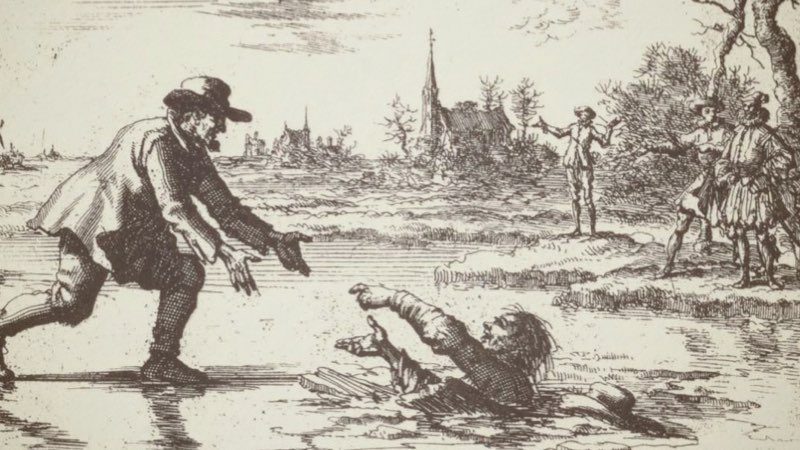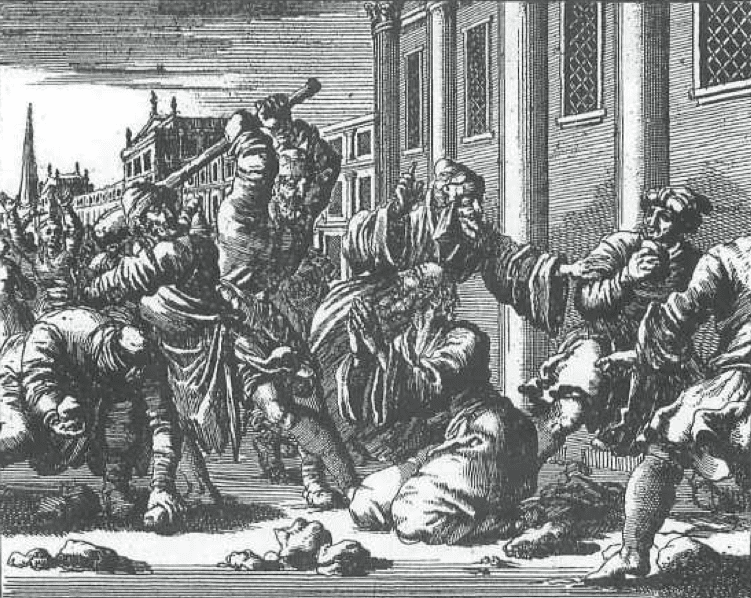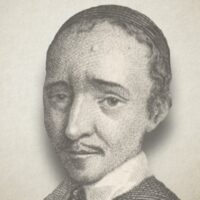
25. The Apostle James, the Less
The Apostle James (the Lesser) stoned and clubbed to death, Jerusalem, A.D. 63
James, the Son of Alpheus, or Brother of the Lord, Cast Down from the Temple, Stoned, and Beaten to Death with a Club, A.D. 63.
James the Lesser was the son of Alpheus, and Mary Cleophas, sister to the mother of Christ; he is called the Lord’s brother. Matt. 10:3; Gal. 1:19.
After proper instruction he was ordained an apostle by Christ, and sent out to minister to the Jews; wherein he acquitted himself well, until Christ’s death. After that, he, with others, was sent out to preach the Gospel, which he did in the Jewish church. Matt. 28:19; Mark 16:15.
And although Peter, and James and his brother John, of whom the last mentioned two were the sons of Zebedee, were regarded as the special apostles, he was nevertheless considered to be one of the three pillars of the church, after the death of James the son of Zebedee, Gal. 2:9.
He was appointed by the apostles the first overseer of the church at Jerusalem; this was shortly after the death of Christ. Euseb. lib. 4. cap. 5. and lib. 2. cap. 23. This office he discharged faithfully for thirty years, converting many to the true faith, not only (though principally) by the pure doctrine of Christ, but also through his holy life, on account of which he was called the Just. Niceph. lib. 2. cap. 38.
He was very steadfast and holy, a true Nazarite, in dress as well as in eating and drinking; and prayed daily for the church of God and the common weal.
This apostle wrote an epistle for the consolation of the twelve tribes who were scattered abroad, saying: “James, a servant of God and of the Lord Jesus Christ, to the twelve tribes which are scattered abroad, greeting. My brethren, count it all joy when ye fall into divers temptations.” James 1:1,2.
But although he comforted with many excellent reasons his own, who believed in the name of Christ, the unbelieving Jews could not endure his doctrine; so that Ananias, an audacious and cruel young man among them, being the high priest, summoned him before the judges, that they should compel him to deny that Jesus is the Christ, and force him to renounce the Son of God and the power of His resurrection. Josep. Antiq. lib. 20. cap. 8. Euseb. lib. 2. cap. 1. verse 22. ex Egesipp. Hi- eron. Catal.
To this end, the chief priest, scribes, and Pharisees placed him upon the pinnacle of the temple, at the time of the passover, that he should deny his faith before all the people. But as he thus stood before the people, he confessed with much more boldness that Jesus Christ is the promised Messiah, the Son of God, our Saviour, and that he is sitting at the right hand of God, and shall come again in the clouds of heaven, to judge the quick and the dead.
On account of this testimony of James, the multitude of the people praised God, and magnified the name of Christ. Then cried the enemies of the truth, Oh, the Just also has erred; let us take him away for he is unprofitable. They accordingly cast him down, and stoned him. But as he was not killed by the fall and the stoning, having only broken his legs, he, lying on his knees, prayed to God for those who stoned him, saying, Lord, forgive them; for they know not what they do.
On account of this, one of the priests begged for his life, saying, What do ye? the Just is praying for us. Leave off stoning! But another of those present, who held a fuller’s stick in his hand, struck him over the head with it, so that he died, and fell asleep in the Lord. He was buried at the place where he had been thrown down from the temple. Hieron. Catalog, in Jacobo Justo. Also, W. Baudart. Apophthegmat. lib. 1. p. 6. ex Euseb. Pamphil. Ccesariense, in hist. Eccl. Strac. in Festo Philippi and Jacobi, p. 133. Anno 62. C. Aetat. Jacobi.
This occurred A.D. 63, in the ninety-sixth year of his age, in the seventh year of the reign of Nero, during an interim in the governorship between the death of Festus and the arrival of Albinus, under the high priest Ananias, who perpetrated this lamentable deed on James.
Concerning this James the following is contained in the Apophthegms of Baudartius: “He was on his bare knees so often and for such long periods, praying to the Lord God for the remission of the sins of the people, that his knees were so hard and callous, that there was no sensation in them at all. lib. 1. p. 7. O the great and constant piety of this holy martyr!
Thieleman J. Van Braght (1625-1664) was an Anabaptist who is best known for writing a history of the Christian witness throughout the centuries entitled “The Bloody Theater or Martyrs Mirror of the Defenseless Christians who baptized only upon confession of faith, and who suffered and died for the testimony of Jesus, their Saviour, from the time of Christ to the year A.D. 1660” (1660).
Thieleman J. Van Braght, Martyrs Mirror





